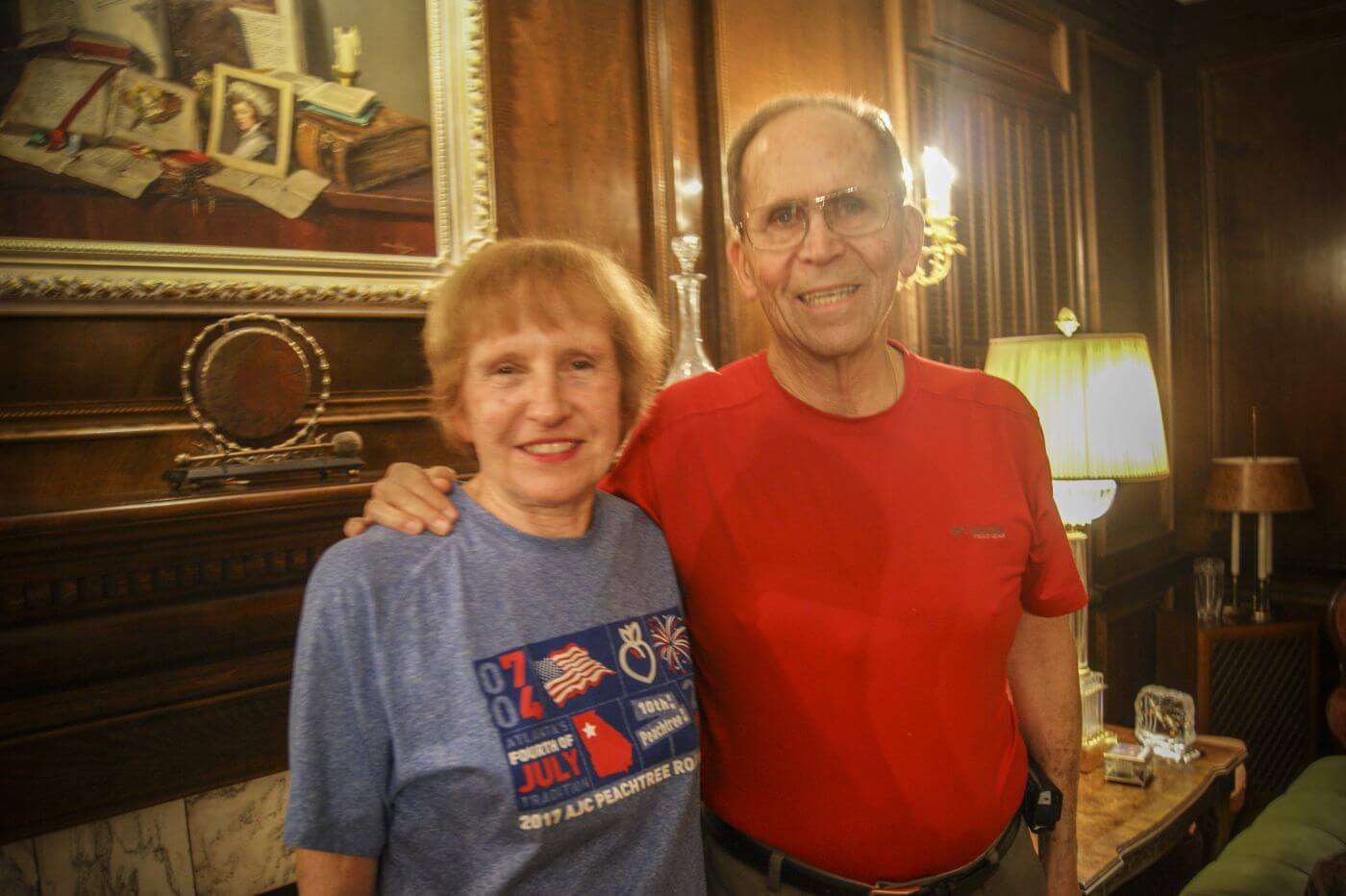Our reporter, Dawid Krawczyk, flew to the southern American state of Georgia to better understand the people who pushed Trump to the presidency. Who are these people? How do they imagine their future? Is Trump’s America the country of their dreams? And most importantly, what caused pious southerners to vote for a bombastic Northerner?
Explore the answers in the third chapter of this Political Critique series. | Text: Dawid Krawczyk.
I.
II.
III.
IV.
I just know that I’m a good candidate – they got nothing on me
***
III.
“Where are you?” I hear on the phone. The number starts with 404, so it must be someone from around Atlanta.
“Sorry, I must have forget to put down your number. Who is this?”
“Matt Stout, we talked in the morning. Like for an hour.”
This is true. I’ve tried to set up a meeting with Matt for more than a month, before finally speaking on the phone that morning. When I was still in Poland I would regularly send him messages on different social media. His name would pop up routinely when I was surfing the Republican internet. Almost a year before the 2016 election, Matt organised a Facebook event for Trump supporters from around Atlanta. His Linkedin profile states that he’s been working as a campaign field consultant for years. In October 2015 he briefly worked for Donald Trump’s campaign. I wanted to ask him, what does a field consultant exactly do, and how does he like this new America that he helped realize.
“We can meet, but there is one topic we’re not going to discuss: my work for the Trump campaign,” he said almost immediately after he answered the phone in the morning. “There is no big story. I just signed a non-disclosure agreement. That’s it. But I’ll tell you about something else, something much bigger and more important, the American war. It’s a war for the American family.”
When he called again, he was in a diner, a couple of minutes from me. I got in my car and drove straight to the Landmark Diner to learn about this war.
“Before we start. Two questions. What do you think about socialism? And do you believe in God?”
I haven’t even properly sat down at the table yet, nor had time to check out Matt’s outfit (white T-Shirt with big TRUMP letters and smaller “Make America Great Again,” cargo shorts, and a red baseball cap with Georgia Bulldogs logo, face tanned and tired from a long day of work) before having to answer these two tough questions.

I say that I’m from Poland, where communism felt apart in 1989 and that it’s not common to support socialism in my country. What I personally think, I don’t say, and he doesn’t inquire. Regarding God: “It’s personal,” I say and add that I come from a Catholic family, but that I have my issues with the priesthood. He nods, looks like I pass.
“You’re not recording any of this? You’re sure?” Matt checks. “And this ring you have, it isn’t some kind of spy camera, right? Come on, I’m joking. So, you met Lucretia at 2 pm, is that correct? Hah, you see, you never told me when you met her, and I know that. You know how? From the KGB. You get the joke?”
Not really, but it became quite clear because after a short break to let the cheeseburgers arrive, Matt helped me out with the explanation.
“It’s from ‘The Office’. Knock! Knock! Who’s there? KGB. Nevermind. You should check that on YouTube.”
He said that he only had two questions, but apparently there are more prepared for this interrogation at dusk in the Landmark Diner. Who’s paying for my trip? Am I married? If I’m in such a long relationship, why I am not married? Do I have kids? Where exactly am I from? Where did I learn English? How do I know such a complicated word like presupposition? What kind of articles do I write? And why did I choose to visit Georgia?
My cheeseburger is almost cold, but if I can’t start to eat it, he won’t stop asking me questions. Matt sips his water through the straw and calculates to what extent he is satisfied with my answers. Satisfied enough.
“OK, so you really want to know what makes America great? I can tell you that.”
He speaks for almost an hour straight. His picture of America is painted boldly, majestically. Details submit to broad strokes that go through the centuries of history. “America is the only country built on the Christian values. That’s the only reason, we can sit here at all,” he assures me. In his narrative, there is space for the Protestant refugees from Europe: the Puritans. What about Native Americans? He doesn’t say a word about them. America is freedom, it’s family, it’s finally the Church, which is a community of people who care for each other, and don’t need the government’s support to do that. This lecture about American exceptionalism is mixed with a critique of Plato’s Republic (for its state totalitarianism) and praise for Aristotle (for his supposed elevation of the family).
“But Trump says that America needs to be made great again. Do I understand correctly that there is something wrong with that greatness nowadays?” I try to accelerate this long introduction, because there is still some ground to cover between Plato and Trump, and even if the diner is open 24/7, I’m not really keen to crash here for the night.
“Very good question. There is a problem and it’s called socialism,” Matt responds immediately. “Lenin, Stalin, Trotsky, they all knew well that they couldn’t break the American people in a military fight. Do you really think they would dare to come here and face a heavily armed nation? So they tried to break us with hand-outs and education. Together with Darwin and Dewey, they wanted to destroy what makes America the greatest country, its Christian foundations.”
Darwin obviously means the attack on the Christian theory of Creationism. “First we told our children that they’re animals, and now we’re surprised that they behave like ones. Look at those riots incited by Black Lives Matter,” Matt exemplifies his point. “Just imagine that right now, somewhere in the US, children are taught in school that they’re animals. It’s crazy.”
John Dewey, according to Matt, is the architect of the nationwide brainwashing scheme of progressive and liberal education which has one single goal: to eradicate Christianity from the hearts and minds of the next generations.
The Antichrist’s tentacles are so omnipresent that they’re even affecting the poor. “You think that the State is handing out all those benefits because it cares about citizens? No, what the State wants is to make people dependent, like a drug. When people are dependent they will obediently go to public schools and get their brains washed. You know Pink Floyd’s Another Brick in the Wall? This what you are for the state, just a social security number, another brick in the wall. We don’t need no education. We don’t need no thought control.”
“But public education and social welfare, you’d like to get rid of them totally?” I interrupt with a question.
“When it comes to education you can homeschool your children, and the Church can take care of us. You just have to confide in God and it’s done.”
Late I’ll learn that Matt follows his beliefs, seven children of his are homeschooled, safe from the dangerous ideas of secular humanism.
“Back in the day I could just go West, build a hut, start a family, and provide for them by hunting. Now, the government knows everything. You have to get a permit for everything. Let me show you something.”
We pay for our water, coffee and cheeseburgers. “Muchas gracias,” Matt gently nods to the waiter. I could’ve bet that the waiter was Greek, but whatever. Muchas gracias. The parking lot is full of pickup trucks reflecting the turquoise and pink neons of the Landmark Diner.
Matt opens the doors of his white Chevrolet. A waterfall of empty cans and Styrofoam cups pours out on to the street, but Matt doesn’t seem to be bothered. He reaches for something on the passenger seat for a modern hunting bow in a camouflage pattern. “I hunt deer with that. And every single one I shoot, I have to report. Can you imagine?”
Later, I went through his facebook profile. Oh, and here we have a bow. Photo taken in the dark, on the hunt, I suppose. The caption reads: “There’s a boy trapped in this man’s body; I’m heading into the woods to get that monster buck that’s been snort wheezin and trying to claim my land as his turf.”
***
Meanwhile, the hunting bow is back in the truck and I’m almost sure that this exciting evening is finally over. We’ll shake hands, muchas gracias each other and our ways will part. But Matt has other plans, obviously.
“Do you want to go see Colonel Gilner?” Matt drops his name and military rank so casually like we’re talking about a common friend of ours. I’m going through notes and memories in my head from the last couple of days, and Colonel Gilner pops back up. I recall from our morning chat on the phone with Matt a story about retired colonel from the US Air Force, a doctor and a Republican.
We hop into my SUV. Matt is impressed with my nice ride and we drive through the dark streets of Buckhead to Colonel Gilner’s home. On the driveway, we pass a coppice and a small pond. Finally, a mansion emerges from the dark. We park the car and climb the stairs.
“Good evening, sir” Matt takes off his baseball cap and creases it in his hands. He shakes hands with the gentleman who answered the door. Colonel Gilner doesn’t look particularly happy with our visit. It’s late evening and we technically haven’t let him know we’re coming, but he politely invites us in. Wonderful living room, walls covered with chestnut wood, and paintings and Japanese silk embroidery hang on the walls. Celia, the colonel’s wife joins us, wearing a patriotic 4th of July t-shirt.

Our small talk doesn’t stay so small because in a couple of minutes we land on the murky topic of Polish anti-Semitism. Doctor Gilner’s family comes from Ostrów Wielkopolski (a city in west-central Poland). He was born in the US but does remember stories about relatives dying in the Nazi extermination camps. He is critical of Poland, mainly because of attempts to wipe away Jewish history and anti-Semitism. But what he really can’t stand is the Baltic States. He will tell me later that obviously, he is very supportive of the NATO alliance, but he would think twice if the Baltic States were to be defended by American forces. All right, but I didn’t come here to discuss Latvian and Lithuanian history.
“Do you remember the day of the elections? One year ago, on November 8, you woke up in the morning and went to the polling station to vote for Trump…,” I open the conversation right after I turn on my recorder.
“I didn’t vote for Trump,” Colonel Gilner calmly responds. And I feel like I’ve been just hit with a Patriot Missile. I was sure that I was here to talk with a Trump supporter. I started wondering if in my exhausted state I’ve confused something. Fortunately, Celia notices that I’m confused and smiles kind-heartedly.
“I voted for Trump,” she saves me. “He didn’t vote for Hillary either. He just didn’t vote for the president. I was upset with him. ‘We’re going to get Hillary because you didn’t vote for Trump,’ I told him”
“Oh, I remember that day clearly”, Colonel Gilner opens up. “Just when it came to strike this thing for Trump. I have a real concern about his level of intelligence. When I saw his name I just couldn’t change my mind and put an x by it. I mean, he shouldn’t have been elected.”
It was the first time ever for Colonel Gilner that he didn’t cast a vote in the presidential election. He is 80 years old now. What exactly bugs the retired colonel about Trump? “I’m frustrated with him. He has no political experience. I don’t see that he has business experience. His ability to negotiate and make a deal? I mean, where did he make a deal? He’s not a diplomat.,” he speaks louder now, and with every objection, his gestures are more dynamic.
Two weeks before I arrived in Atlanta, Hurricane Maria pummelled Puerto Rico in the northeast Caribbean Sea. When Trump paid a visit there, instead of rolling up his sleeves and hugging despaired people, he started throwing paper towels into the crowd as if he was some kind of mascot at a basketball game.
“Just look what happened when this hurricane hit Puerto Rico. The one thing you don’t want to do is getting in a fight with the people that are down there, working and trying to get things straightened up. And that’s exactly what he did.”
Colonel Gilner has a severe allergy to boastfulness. He praises Matt for his hard work on behalf of conservative candidates, and me for travelling to the other side of the globe to learn something about the American politics. “People should never say ‘what a good job I did’. That’s for other people to say. You don’t do those things. When you brag about it, you lose the benefit you get from doing a good job. I’ve got one of our nation’s highest awards here, but you don’t become a colonel by going around and saying how wonderful you are,” he lectures.
In 1997 he received the Legion of Merit from President Clinton, a military award for exceptionally meritorious conduct in the performance of outstanding services and achievements. Next to that award, there are two Meritorious Service Medals. I’m staring at those medals, and Colonel Gilner feels obliged to point out that he doesn’t run around the neighbourhood and brag about what a marvellous soldier he was.

“I’m really concerned with his level of intelligence. He shouldn’t have been elected. I can’t explain it, but it’s a fact that the majority of people who voted for him were not college educated. Unfortunately, those who are college educated are more Democratic these days,” he says.

Matt picks up the topic and starts his tale about how socialism is forcing its way to colleges and penetrates the minds of the youth. This performance is surprisingly different to what I experienced half an hour ago in the Landmark Diner. Over the cheeseburger, he was proud and confident. At the Colonel Gilner’s mansion, he is modest and timidly trying to endear his point to the host. I almost feel sorry for the baseball cap he is squeezing in his hands. “I don’t know. I don’t want to draw such conclusions.” he is put down by Colonel Gilner.
Celia excellently diffuses the tension with her story of a political metamorphosis from being a Democrat to supporting Republicans. She grew up in the American Midwest. Everyone around her voted Republicans, she perversely supported candidates on the other side of the barricade.
“I was a Democrat until I saw this horrible behaviour of Democrats. Shutting down people. A friend once told me, when she goes to Republican rallies they tell them to pick up all the trash. You see the Democrats leave and everything is trashed,” Celia says with contempt. “There is some kind of privilege right to be a Democrat. I would be ashamed to call myself a Democrat, because of the whole misbehaviour and horror of the Democratic Party. It’s now accepted that students take over buildings on campuses. How are we bringing up the next generation?”
After a short pause to catch a breath, Colonel Gilner finds more energy to grill Trump. “He’s uninformed. He’s read very few books. His main source of information is Fox News, which is fine, but you should have the variety of things. He gets reports from the intelligence agencies, but he wants it on only one piece of paper. He doesn’t even want to get regular reports. It really has offended the intelligence community and the FBI.”
He’s not finished yet, he is really furious about how Trump provokes this “jerk from North Korea” and about the idea to deport people who came to the US as children and stayed as undocumented immigrants. “I agree with Trump completely on safeguarding our border, doing whatever it takes to save our border. Democrats and the left want the open borders, that’s the most ridiculous thing on earth. We cannot be a nation without a border. The wall, I don’t know about it, but I don’t think we should send someone back that has been here for 20 years. It would be in biblical terms a sin, it’s not the country we are. I was just reading in the Wall Street Journal they’re working on some solution to DACA (The Deferred Action for Childhood Arrivals). Matt, do you read the Wall Street Journal?”
“I do, but I don’t read it as much as I read the bible,” he replies a bit surprised.
Colonel Gilner goes on and on and at some point, he confesses to being frustrated with Trump’s presidency, but he finds peace in thinking that everything passes, even Trump. His hopes are with the military elite surrounding the President, as he knows personally some of the generals who are close to the White House.
Before we go, there is one last dispute that has to be played out between him and Matt. It’s about public education. Colonel Gilner is a staunch opponent of teaching religion in the public schools. For Matt, other subjects are just mere footnotes to studying Bible. The retired doctor must have felt invited with that disagreement to share other opinions that may be considered unorthodox by conservative Republicans, to say the least: “I’m against the NRA. I’m against having penetrating bullets that can go through armor. I’m against silencers. I’m against automatic weapons of any type. I’m for abortion. I’ve seen what happens when you don’t have an abortion: they go and get an abortion anyway, they get sick and they die.”
A couple of days later when I’ll be traveling with Matt around the places north to Atlanta he’ll refer to the meeting with Colonel Gilner while talking with locals. “He is a liberal. He told me was a Republican, but he didn’t even vote Trump and then he started talking all those liberal things. He is a liberal.”
To be continued…
![Political Critique [DISCONTINUED]](http://politicalcritique.org/wp-content/uploads/2015/09/Political-Critique-LOGO.png)
![Political Critique [DISCONTINUED]](http://politicalcritique.org/wp-content/uploads/2015/09/Political-Critique-LOGO-2.png)